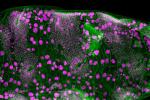Remodeling of epidermis during larva to adult fly transformation
Movements, fusions and closures of epithelial tissues are important for animal development, e.g. during embryogenesis but also for healing of wounds. The fruit fly, Drosophila melanogaster, offers several model examples of such epithelial movements and fusions. An interesting case is the formation of the adult fly abdomen. During metamorphosis of a maggot into fly, large larval epidermal cells (LEC) must leave the epithelium to free space for new cells (histoblasts), which rapidly proliferate and migrate to occupy the entire surface of the abdomen, then produce the adult cuticle. Regulation of this complex exchange of cell populations is unclear. It has been known that the entire process, like metamorphosis of other tissues, is stimulated by the steroid hormone ecdysone, and that the extrusion of LEC requires cytoskeleton changes dependent on the Rho signaling pathway. Unexpectedly we have implicated in the abdominal morphogenesis Atf3, a transcription factor of the bZIP family. Activity of the atf3 gene must be restricted during the exchange of the two cell populations, as deregulated atf3blocks removal of LEC from the epithelium by interfering with Rho signaling and increasing LEC adhesiveness. These obsolete larval cells consequently obstruct closure of the adult epithelium. To exert this effect, Atf3 requires its binding partner, the oncoprotein Jun. Although interaction between these two regulatory proteins has been well documented by in vitro studies on mammalian cell lines, our results for the first time demonstrate a developmental function of the Atf3-Jun complex in vivo. We have published this study in collaboration with our former student, now group leader at the University of Cologne, M. Uhlirova, in the journal Development with a cover illustration.














